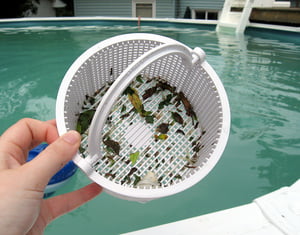Daily maintenance on your pool will ensure that it keeps running smoothly for you during the summer. With these tips, your pool filter will run effectively, and your water content should stay within a safe chemical range for swimmers!
The first thing you should do each morning is turn off your filtration system to check your skimmer basket. If it has collected leaves, twigs and other mysterious floating items in your pool, you need to take a moment to empty it out. Keeping this basket free and clear of debris allows water to easily flow into your filter for cleaning. If you have two baskets, be sure to check both of them!
Then, turn your filtration system back on and check your water return valve. Is it shooting water back into the pool at a steady, even pace? If it seems to be choking, or is not as forceful as you’re used to, you need to do a backwash on your filter. This will clean the tiny particles of debris out of your filter so that you water can easily flow through the filter and back into the pool.
Turn your filtration system off, and turn your dial on the top of your filter to “backwash”. When you turn your system back on, water will be directly drained from your filter, out through your drainage hose. Be sure your hose is draining to an appropriate spot, such as your own yard, or a sewer drain, if your city allows.
Run the backwash for at least 3-4 minutes. On the side of your filter, you will see a small glass jar filling with water. At first it will look cloudy, then it will gradually get clear. Once it’s clear, you can turn the filtration system off.
Now, turn the dial on your filter to the “rinse” setting. Turn you filtration system back on, and let the rinse cycle go for another few minutes. After that is complete, turn your system off, and change the dial to “filter”. Turn your system back on, and check the flow of water at the return valve. It should be more forceful and steady.
Now, since you have drained a lot of water out of the pool through the backwash and rinse cycles, check your water level. Be sure air is not getting into your system through the skimmer basket. Add water as needed to get your pool up to it’s appropriate water level.
Next, we need to test the chemical make-up of the water. This can be done easily and quickly with a simple dip stick test available at your local pool store. These test sticks will give you information about the level of chlorine or bromine in your pool, the alkalinity and the pH. After taking the reading, adjust your chemicals as needed to balance the pool. If this procedure is new for you, be sure to read “How to Test Chemical Levels in Your Pool: Summer Pool Safety.”
If your free chlorine is getting low, it is best to add chlorine, or “shock” your pool in the evening, since sunlight breaks down the chemical structure of chlorine, making it less effective during daylight hours.
By following this 10 minute daily pool check, you will ensure that your pool is operating smoothly, effectively and is safe for swimming!
